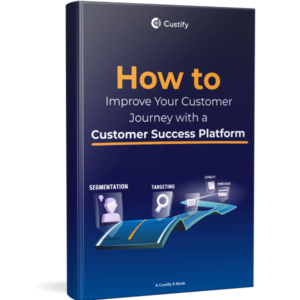Customer Success Manager is one of the fastest-growing jobs in technology, particularly in the SaaS industry. As the competition is growing, we think there’s no better time than now to discuss what it takes to become a good CSM.
In a previous article, we’ve addressed what it means to be a Customer Success Manager and how they’re different from Account Managers. But CSM’s are defined by more than just skills and a job description. They’re also defined by how they react to certain situations.
So if you want to learn how to be a good Customer Success Manager, below we’ve gathered advice from 15 CSMs from all over the world. Here’s what they say:
1. Don’t take customer reactions personally
As Customer Success Managers, sometimes we make someone’s day, sometimes we’re the first to receive customers’ complaints – and not always in the nicest way. What you should always keep in mind is that you shouldn’t take feedback personally. Often, it’s not something you did (or didn’t!), it’s about the customer’s context.
“I always tell our staff that they shouldn’t take the customer’s reaction personally. The customer may have had a bad day or experienced something that we’re not sure of. So if they’re hostile, just don’t take it personally. And try to help their problem.” – Jeff Neal, Engagement Officer at The Critter Depot.
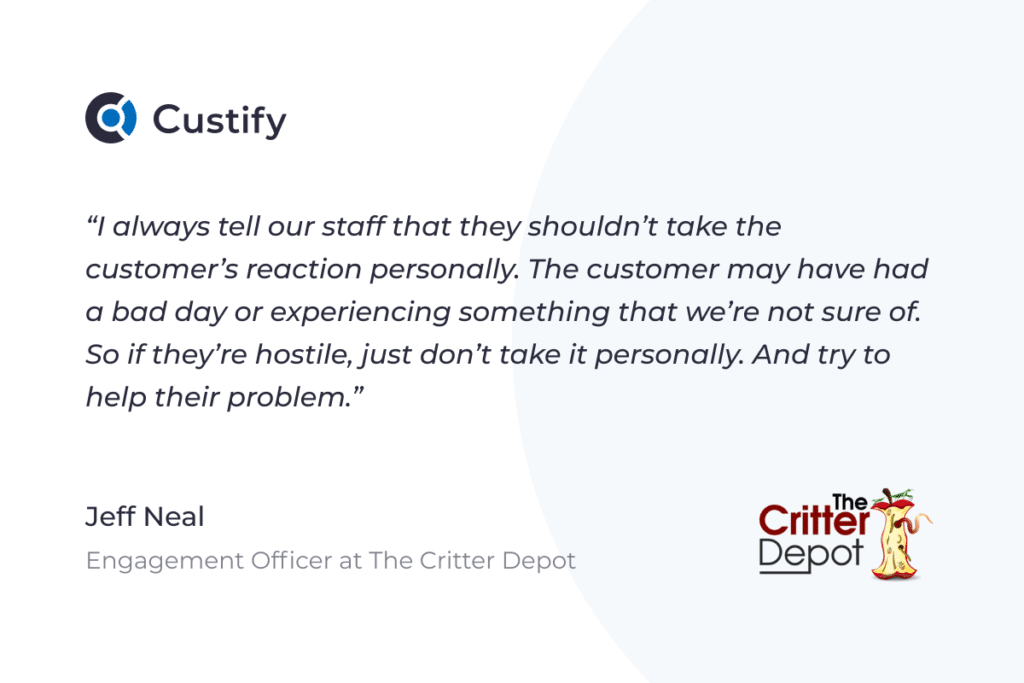
2. Always segment your customers based on their needs
We’ve addressed the topic of customer segmentation on our blog before. We cannot stress enough how important it is to think in terms of problems and needs: what issues / needs does my customer have? How can I solve them? Can I customize the product or adapt my workflow to help them?
“Not every customer is the same, and as a result, everyone should be treated differently. For example, what you provide for your biggest clients could prove too much for smaller clients; and if you provide the same type of service to your bigger clients as you would to smaller ones, then you would risk not meeting their needs.” – Tal Shalef, Realtor and Co-Founder of Condo Wizard.
3. Prioritize your customers’ wellness over your gains
This one’s so obvious sometimes we forget about it. And it’s not always intentional; we might just be so enthusiastic about certain features / services that we want everyone to use them. So we push them to clients through upsells.
But sometimes, you need to take a step back and honestly ask yourself, “is this really going to benefit this customer?” You certainly don’t want to disappoint them by creating false expectations.
“Remember that your customers are the bread and butter of a business. Without their support, your business won’t stand. Putting off a product or service that might disappoint them will only fight back to your company.” – Robert Johnson, Founder of Sawinery.
Keep in mind that overselling doesn’t just hurt your relationship with your customers, but also your bottom line:
“We’ve seen this mistake in the past where the customer was oversold the service, for which they then had to be reimbursed.” – Chans Weber, Founder & CEO of Leap Clixx.
Making sure you understand what customers need to succeed is a big part of your job as a CSM, so we recommend learning how to implement & utilize customer health scores efficiently.
4. Be flexible, but stay productive
Planning our day certainly helps us be productive. But sometimes, the unexpected happens. And when it does, it’s best to be flexible and re-organize and re-prioritize everything. And don’t be too hard on yourself when things get delayed.
“Manage your day with a specific goal, and align your plans with it. Whether it’s this or that, the important thing is, at the end of the day, you were able to make it productive while still aligned with your aim.” – Willie Greer, Founder of The Product Analyst.
However, you shouldn’t put off non-urgent tasks indefinitely as they might never get done. When everything is an emergency, then nothing is an emergency.
“While your mailbox likely gets flooded with customer requests every day, it’s critical that you put together guidelines that will help stay on track throughout the day. Otherwise, you might find yourself in a situation where you feel both overwhelmed and unable to allocate time to non-urgent issues.” – Agata Kmieć, Customer Happiness Officer at ResumeLab.
5. Don’t piss off your customers
The customer is always right, even when they’re wrong.
We agree, not pointing out when a customer is wrong is hard. But at the end of the day, blaming a client is not worth it as they will only get more defensive or even turn aggressive. Would you risk turning a minor issue into a PR nightmare?
“They can voice their displeasure on social media and / or leave a negative review. Remember a lie gets halfway around the world before the truth has a chance to get its pants on.” – Daniel Foley, Consultant
6. Don’t multitask
The job of a Customer Success Manager is not an easy one – there are many tasks we need to accomplish in a day. Even so, you should steer clear of multitasking as this will not bring you the best results.
“Sometimes, CSMs try too hard to juggle things simultaneously, from following up on customer education training, setting up update calls, building emails, and platform updates to setting up some professional service offerings and more. The best thing to do is to take your time planning and pace things out. Avoid this mistake to create an easy workflow for each task.” – Aaron Simons, Founder of TestPrepGenie.com.
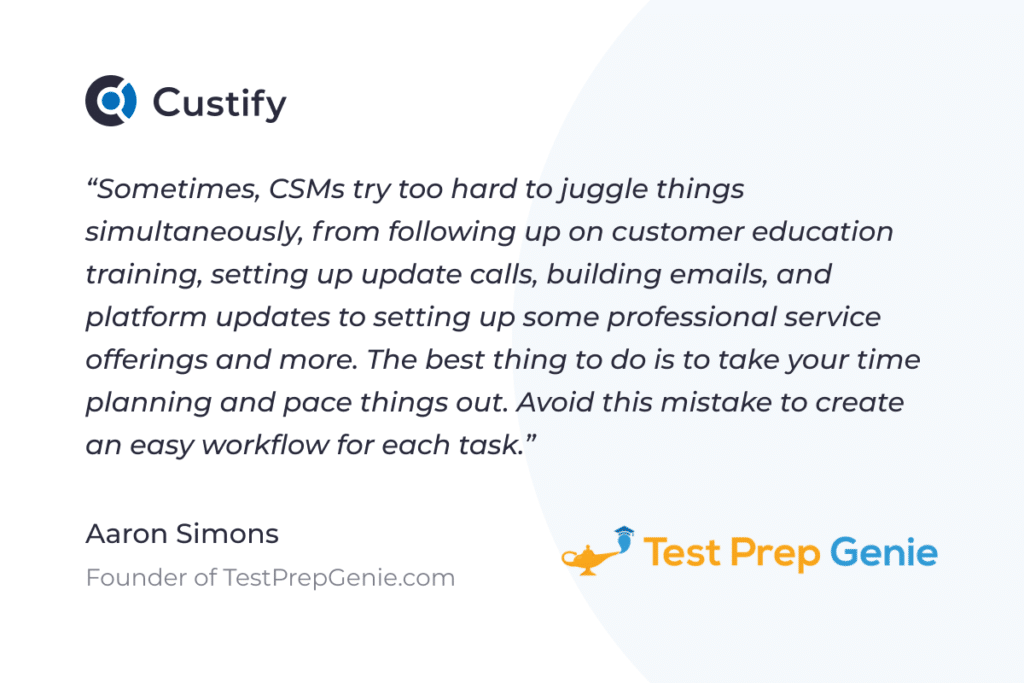
7. Don’t delete negative reviews
To gain your customers’ loyalty, you need to provide them with the tools they need to give you feedback. It’s vital that you implement a ‘Contact us’ form, ‘Rate this’ button, or online community forums where clients can express their opinions. Additionally, you can also ask them directly to tell you how they feel about your product.
Granted, not all the feedback you’ll receive will be positive. But it’s important not to delete negative comments – instead, show your customers you value and appreciate their opinion and that you’re taking the necessary steps to fix issues. Both current clients and possible leads will appreciate this.
“If my company receives negative feedback, the first thing we do is an instant reaction with an honest reply showing high appreciation and ensuring that the reviewer’s opinion will be taken into account. Businesses may surprise negative opinion generators with a reward as a sign of a firm’s apology. This could be anything starting from a special discount to free membership or additional service.” – Monika Ryzkovaite, Customer Success Manager at Megaventory.
8. Don’t micromanage your team
If you’re always checking up on your team and telling them exactly what to do and how to do it, you’re showing them you don’t trust them. Not to mention, you lose the opportunity of trying new approaches you wouldn’t have thought of.
“If you already know that the person is competent to do the job, make your expectations of results clear, let them do it however they want, and counsel them when they present the results.” – Tim Clarke, Director of Marketing & Customers Sales at SEOBlog.com. Our research on quiet quitting in customer success shows 15% of CS people would perform better with support from management. So, instead of micromanaging, try to promote an atmosphere of trust that encourages everyone on your team to be open about their issues
9. Don’t solve customers’ problems
This is an odd one. Solving customers’ problems is, indeed, crucial to Customer Success. However, that’s a job for Customer Support! Your job is to be proactive, not reactive, and prevent the problem from happening in the first place.
When an issue occurs, you should let the most suitable representative in your team solve it, and you concentrate on optimizing the customer journey, screening for churn reasons, and making sure these issues never happen again, to the best of your ability.
“In a bid to create the perfect customer experience, customer success managers must be proactive and not reactive. They must continuously analyze all aspects of a potential customer’s journey and identify and correct all possible sources of problems.” – Jane Flanagan, Lead Project Manager at Tacuna Systems.
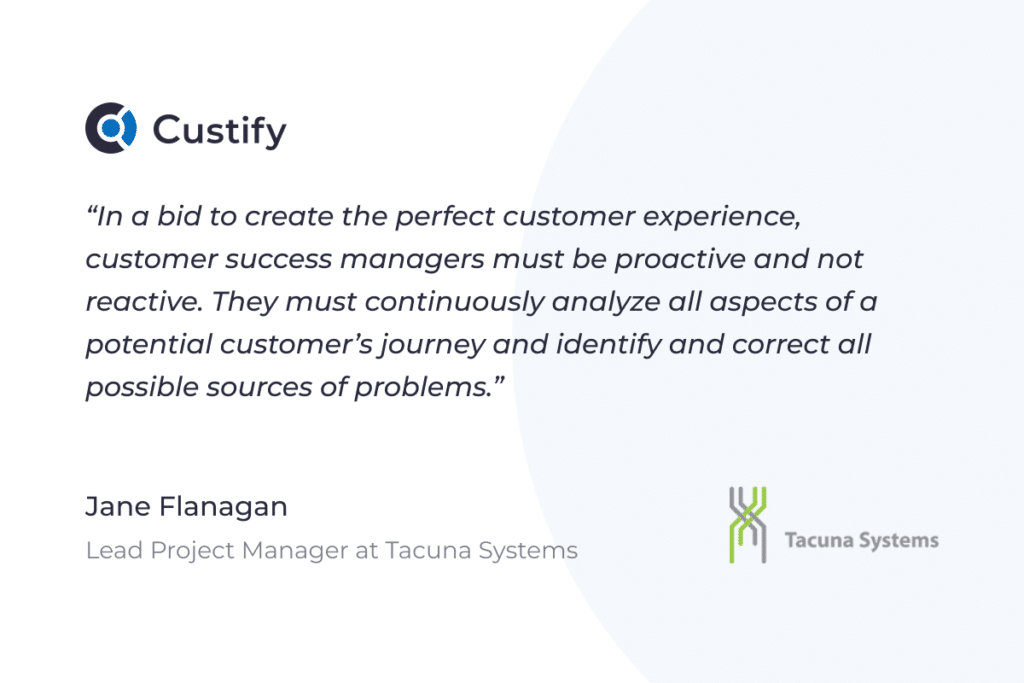
10. Don’t make promises you can’t keep
Of all the roles in an organization, CSMs have the most freedom to go the extra mile in helping customers. But this doesn’t mean losing sight of what’s possible and what’s not, as this could create further problems for customers or other employees.
“Newer CSMs are often too quick to agree to or offer things that they cannot fulfill. This then creates a difficult situation in which another employee or manager is disadvantaged, has problems fulfilling the promise, or, worse, the CSM cannot deliver their promise to the customer and so exacerbates the initial issue even further. It’s vitally important for all CSMs to fully understand the line between where using their own initiative transitions into being unreasonable or unrealistic in expectations on behalf of a customer.” – Alice Jacobson, Customer Success Manager at English Blinds.
11. Don’t over-communicate
Yes, there is such a thing as over-communicating – when you’re calling / emailing your customers every single day, or, sometimes, even multiple times in a day. Instead, you should aim to gather every information you need during the onboarding call and then reach out when there’s absolutely necessary.
“There are CSMs that do weekly ratings / assessments, asking for testimonials, check-ins, etc. We noticed that clients actually appreciate it if we get everything on the onboarding call, and then just operate with those principles.” – Karla Singson, Country Manager at WowSupport.com.
12. Prioritize customer onboarding
In order to be able to transform your customers into promoters and advocates, you need to pay special attention to customer onboarding. When onboarding a new user, you should:
- Try to understand what it takes for them to be successful;
- Move them toward that success.
Once they understand how your product fits into their business, your job becomes much easier.
“As the product is new to the customer, it’s difficult for them to understand the true value of it. It’s your job to personalize the onboarding process based on the client’s needs. This will guarantee customers’ higher satisfaction and better experience and eventually result in a higher retention rate – which should always be the north star metric for this job.” – Maciej Baranowski, Head of Customer Experience at Zety.
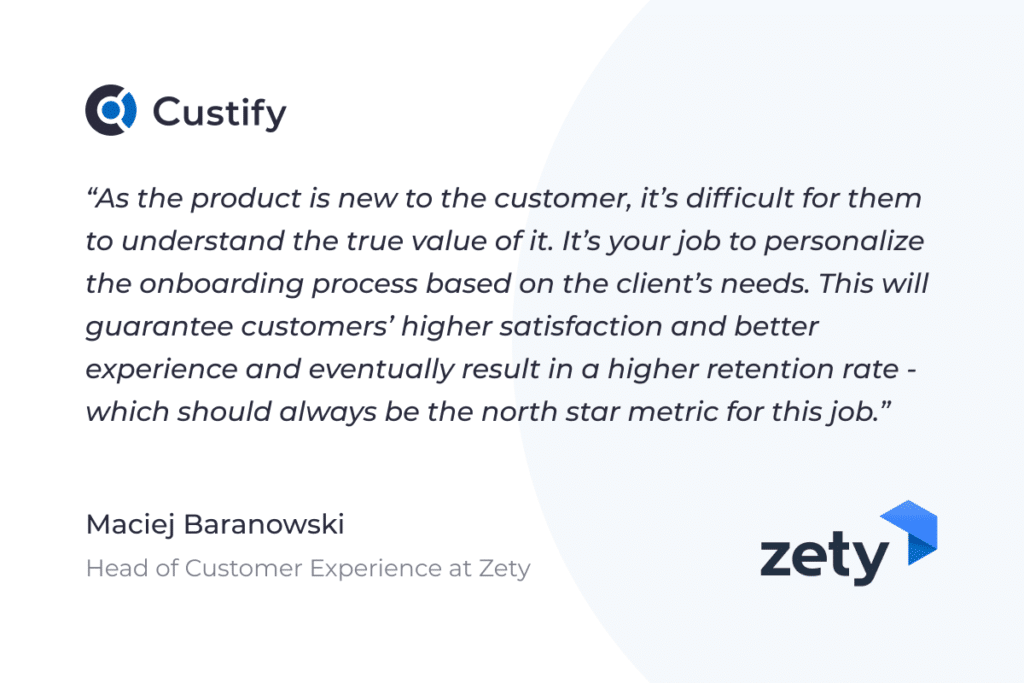
13. Never stop learning…
…about your product, and your customers. As a Customer Success Manager, you might think you know your product inside and out. Then comes the day when a client comes with a unique use case you’ve never thought of before.
Every once in a while, it’s useful to look at your product with a user’s eyes. This will help you find new ways to improve it and provide you with unique insights you can use to help your customers.
The same can apply to your user persona – you might think you know who your users are, but the truth is, sometimes you can be surprised with user segments you’d never thought about.
“There shouldn’t be a single day when you’re not actively testing your own product: playing through different scenarios, testing new (and old!) functionalities, experimenting with solutions.
Treat each new customer as if it is your very first customer that you have ever spoken with – you’ll learn new things, gain new insights, and collect invaluable information for your product teams.” – Siim Kanne, Customer Success Manager at MRPeasy.
Do you have any other advice on how to be a good Customer Success Manager? Share it with us in the comments section below.




